
COVID-19: Its Effect in Mathare and MOHI’s Response
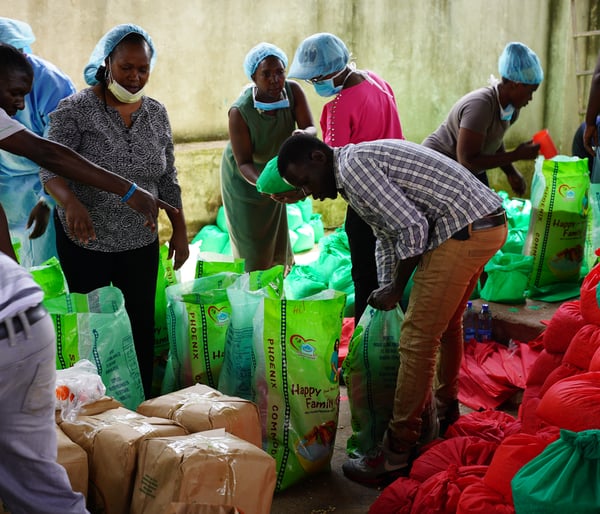
COVID-19: The name that is on everybody’s tongue and across almost all media outlets in the world. The disease that has swept across the globe and changed the way the world operates.
When it was first reported in December 2019 in Wuhan, China, no one thought this illness would have the kind of impact it has had. This perception would soon change as the number of casualties continued to rise.
On 28th February 2020, Kenya - like the other nations of the world, took definitive steps to protect her citizens. The President issued an Executive Order that contained a raft of measures including the establishment of a National Emergency Response Committee on Coronavirus headed by the Cabinet Secretary for Health.
It would seem these steps were taken just in time because the country reported the first confirmed case on 12th March 2020. A few days later, on 15th March 2020, two more cases were confirmed and immediately the President issued a number of directives. Key among these was the requirement to have all schools closed by 20th March 2020 and to have businesses allow their people work from home.
Right now, the number of confirmed cases in Kenya stands at 216 (as per Tuesday 14th media briefing). With these growing numbers, the government’s directives aimed at curbing the spread of this disease have become more stringent. And these in turn, have had a direct impact on everyone living in Kenya and more so those living in disadvantaged communities.
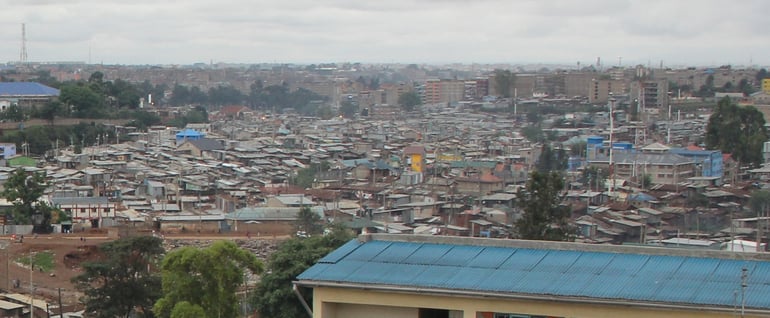
The decision by the government to have schools close early had a direct impact on operations at Missions of Hope International (MOHI). Our students were not able to complete their school calendar and went home not having done their end of term examinations.
For our parents, having their children stay at home unexpectedly found them unprepared to feed the extra mouths three times a day. Most MOHI families rely on the feeding program to help them meet their basic needs and fend off food insecurity.
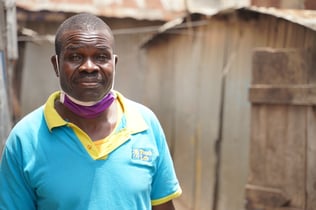 “As parents, we will always look for a school that has a school feeding program because we then only need to cater for one meal,” says Joseph Agutu a father of seven who has four of his children at MOHI’s Mabatini center.
“As parents, we will always look for a school that has a school feeding program because we then only need to cater for one meal,” says Joseph Agutu a father of seven who has four of his children at MOHI’s Mabatini center.
“When my children are in school,” he continues, “they will have porridge or milk at 10 a.m. and a nutritious, filling, lunch. By the time that child comes home in the evening, they are not really hungry and often have very little to eat at supper time. But right now, the situation is different. Being at home, they want to eat all the time and we are having a hard time making this possible.”
Joseph is just one of the many parents who reveal just how heartbreaking it is to have your child say they would rather be in school than at home.
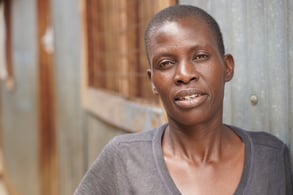 “When they ask me; ‘What are we having for lunch mum?’ and I have no response, it really breaks my heart,” says Catherine Atieno, a widow and a mother of six who has four children at MOHI’s Gitathuru center.
“When they ask me; ‘What are we having for lunch mum?’ and I have no response, it really breaks my heart,” says Catherine Atieno, a widow and a mother of six who has four children at MOHI’s Gitathuru center.
“The young ones will even cry and ask me to take them to school. I am doing the best I can but it’s just not good enough.”
The other directive from the government, that has had a direct impact on the communities we serve, is that of social distancing. It has led to loss of income for many in Mathare who rely on casual jobs that earn them a daily wage.
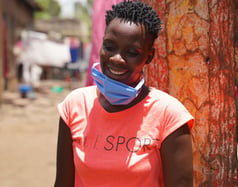
“Since this Coronavirus came up, many of us no longer have a way to earn an income,” says Jamila Achieng, a mother of four who has two children at MOHI’s Kariobangi center.
"Just like me, many women from disadvantaged communities rely on the money they make working in homes as housekeepers.
These jobs are no longer forthcoming since our employers now say they do not want us coming to their houses because we may bring them the virus.”
To try and mitigate some of the challenges faced by the communities we work with, MOHI’s first response was distribution of food baskets to our parents.
According to Leonard Chumo, MOHI’s Director of Missions, each basket contained non-perishable food items, soap, Coronavirus prevention information and a short devotional message.
Approximately 3,000 families from Nairobi and Molo were reached.
“We work and serve among the most economically challenged communities in Kenya and in these places, the impact of the COVID-19 was immediate,” Chumo says.
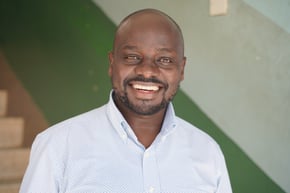 “We therefore could not watch and do nothing as the families we serve faced imminent hunger. With help from friends and partners, we extended this helping hand to the very needy families identified by our social workers, community pastors and parent associations.”
“We therefore could not watch and do nothing as the families we serve faced imminent hunger. With help from friends and partners, we extended this helping hand to the very needy families identified by our social workers, community pastors and parent associations.”
“Unfortunately, we could only reach about 20 percent of the families we serve. We are trusting God for a second phase to enable us reach many more families and share the hope of Christ to the community in this challenging season.”
Following the government’s directive that everyone should wear a face mask, MOHI has gone into production of high quality masks that are being offered at an affordable price.
According to the person-in-charge of this operation, Kula Kilonzi, the masks consist of three pieces of non-woven material stitched together. With access to masks, families can better protect themselves, protect others, and leave their homes without the risk of being fined $200.
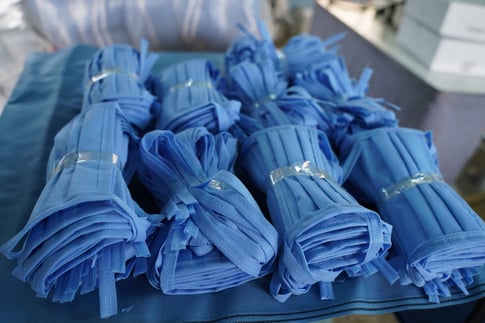 “The need for these kind of masks is great and we are currently doing an output of about 1,000 pieces a day, Monday to Friday,” he said.
“The need for these kind of masks is great and we are currently doing an output of about 1,000 pieces a day, Monday to Friday,” he said.
As pertains the directive to have people work from home, MOHI has come up with measures to make this possible while ensuring that staff members remain available to the parents and the community we serve. This includes making sure we are in constant communication with them.
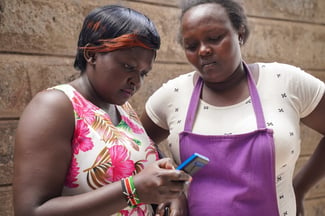
“I receive calls all the time, even at night, from parents who just want someone to talk to,” says Rose Mutula, a social worker at MOHI’s Bondeni center who confirms that many people are overwhelmed by the current situation and need a lot of emotional support.
“I also make sure to call them and find out how they are doing,” she continues. “I share words of encouragement with them, ask them to stay safe, to wash their hands and follow the government’s directives and remind them to have their children keep up with their studies by revising".
"There are also those I have to follow-up to ensure they are keeping their doctor’s appointment or are taking their medication as prescribed. I also encourage them to pray and keep their hope in God.”
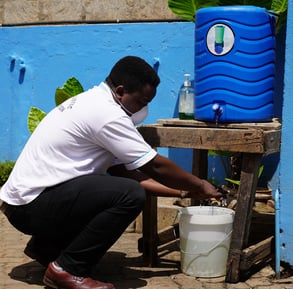
And because ‘wash your hands’ has become the new clarion call in the fight against Coronavirus, we are not taking it for granted that everyone understands what this means.
Through the Community Health Evangelism (CHE) trainers, MOHI’s health department has embarked on a strategy that involves training community members on the specifics of sanitation and hand hygiene.
“Our CHE team is doing this using a two pronged approach,” says Dr. Ben Osinde, the manager of MOHI’s health program. “The first is by making weekly phone calls to community health volunteers and various key community leaders to train them on a relevant topic which the trainee is then encouraged to disseminate to neighbors and family.”
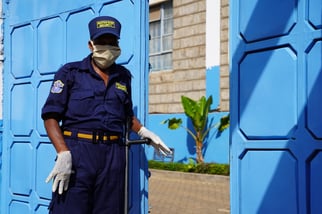 “The other approach has been to provide training on hand hygiene and proper use of a face mask including how to wear one.”
“The other approach has been to provide training on hand hygiene and proper use of a face mask including how to wear one.”
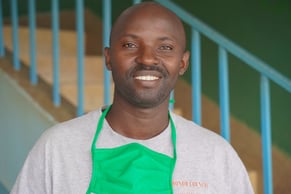 Within the centers, Dr. Osinde says measures have been put in place to ensure all staff manning the entry points are provided with gloves, face masks and sanitizers. There are hand washing stations to ensure anyone who comes in maintains the requisite hygiene. Also, staff members and volunteers going into the communities are given protective gear.
Within the centers, Dr. Osinde says measures have been put in place to ensure all staff manning the entry points are provided with gloves, face masks and sanitizers. There are hand washing stations to ensure anyone who comes in maintains the requisite hygiene. Also, staff members and volunteers going into the communities are given protective gear.
In everything we are doing as an organization, we know that ultimately, unless the Lord is with us, all our efforts will amount to nothing.
So, as we talk to, train and interact with the community - sharing with them a word of exhortation and prayer is key. We know hope only comes from Jesus Christ and only He can provide the hope the world needs at this time. As MOHI Co-founder and Executive Director Mary Kamau so aptly notes:
“We carry the hope of the world and that is Jesus Christ. He is with us and in us and is greater than he that is in the world. God is going to intervene and will bring healing into our families and into the nations.”
And so, as MOHI, we diligently do what we can for the communities we serve, but we look to God for we know our help comes from Him alone.
Comments